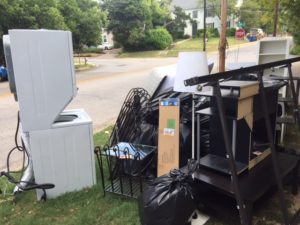The Abstract and The Credit Score - Collecting Judgments in Texas
Raise your hand if – as a lawyer – you’ve had difficulty collecting a judgment once it’s been rightfully handed down by the courts. I am willing to bet that if I asked this question to a room full of my contemporaries, I would I’d see a lot of hands.
This may be hard to believe, but getting your day in court, against someone who owes you money, may not necessarily be your happy ending. Actually, it can often be the beginning of a long and seemingly endless road ahead.
View EntryLosing the Condo (Foreclosure and eviction)
Foreclosure, eviction and collecting debt.
This case happened in Austin. Foreclosure and eviction is what follows.
We were originally hired to foreclose on a condominium situated on the outskirts of the University of Texas campus. We followed our usual foreclosure procedures and obtained title to the property.
The client then entered into prolonged negotiations with the debtor to resolve the debt. The negotiations continued for over six months. At that point in time the debtor had not made payment on the debt for more than a year. Eventually, no resolution was found and we were instructed to evict the debtor from the property.

When the Sheriff puts your stuff on the street.
We filed the eviction in the justice court and prevailed. The debtor appealed. We then went to trial again in the County Court and prevailed again.
We had an agent of ours stop by the condominium a few days later to see what the debtor’s plans were for moving out. But the debtor said, “there was no foreclosure.” One of the worst cases of denial we have ever seen.

When the Sheriff puts your stuff on the street.
We then moved forward with a writ of possession. The debtor retained a lawyer in Austin to seek a temporary restraining order to stop the execution of the writ of possession. Just before the debtor’s property was to be put on the street we appeared before a judge in Austin. The judge denied the temporary restraining order and we went forward with the writ of possession as you can see in the attached photo.
The client then sold the condo at a profit and all’s well that ends well.
You Have a Judgment, Now What?
You Have a Judgment, Now What? Here’s How You Collect.
So, life isn’t always fair. You hired a lawyer. You went to court and won. But, you don’t have your money.
Now, you’re frustrated chasing payment after you did the work you promised to do or loaned money, trusting you’d be repaid. The truth is that unfortunately, many businesses and law firms find themselves in this position.
Don’t worry. We’ve put together this straightforward “how-to” for how you can finally collect the judgment you are rightfully owed.
View EntryHard Work Pays Off
Relentless pursuit of the debtor is our playbook for collecting debt.
In this case we were stymied by the debtor from learning about his assets. As you will see, we relentlessly pursued the debtor. He even did some time in jail.
But the judgment was collected in full. But not immediately…
The timeline of events:
- March 24, 2014 – Default Judgment entered against the defendant.
- March 27, 2014 – An an abstract of the debt was recorded in several counties where we thought the debtor might have property.
- May 12, 2014 – We sent post-judgment discovery to the defendant. The defendant ignored the discovery.
- June 25, 2014 – Because the defendant refused to answer the discovery, we filed a motion to compel the defendant to respond.
- July 24, 2014 – The judge ordered the defendant to respond to our discovery- but the defendant ignored the judge’s order and never answered the discovery.
- August 12, 2014 – Because the defendant refused to do what the judge ordered him to do, we we filed a motion with the court for the defendant to be held in contempt.
- October 16, 2014 – The judge held a hearing but the defendant did not appear. So the judge issued an Order for Writ of Attachment. This order told law enforcement personnel to arrest the defendant. At that point the Sheriff went to the Defendant’s home and arrested him.
- October 18-19, 2014 – The Defendant was jailed, posted bond and then was released
- Late October 25, 2014 – We entered into a settlement with the Defendant that called for a payment plan. The client agreed that the Defendant did not need to answer the post-judgment discovery so long as payments were made. So we did not dismiss our motion for contempt, just in case.
- February 2015- The Defendant made three months of payments and then the Defendant stopped making payments.
- March 4, 2015 – We filed our 2nd Motion for Contempt since the Defendant has still not answered the post-judgment discovery we sent to them.
- May 14, 2015 – The hearing was held and this time the Defendant appeared. He promised to provide the discovery answers so the judge issued an order, but did not require any jail time. However, no answers were given.
- June 5, 2015 – Because the answers the Defendant promised to the judge were not delivered, we filed our 3rd Motion for Contempt, again seeking jail time for the Defendant.
- June 2015- The Defendant put his homestead up for sale.
- July 20, 2015 – The sale of homestead was held up briefly by the abstract previously filed. The Defendant decided that rather than request a release of his homestead (something we would be required to give him had he asked) that he would just pay the judgment in full out of the proceeds. At this point he was exhausted and just gave in.
- July 29, 2015 – Release of judgment filed.
We represent lawyers
We represent lawyers in collecting fees.
An unwritten rule says lawyers should never sue their clients, even if they refuse to pay their legal bills. But at the firm we’ve been blazing a new path by representing attorneys in Texas and across the nation in disputes over unpaid legal fees.
During the past 10 years, law firms have experienced a staggering 10 percent drop in the amount they collect versus what they bill their clients, according to a 2016 report from Georgetown University Law Center.
Darrell W. Cook and Melissa J. Parker recently helped the Atlanta-based law firm Hanks Brookes, LLC, prevail in a claim against State Bank of Texas. The case was filed after the Dallas-based bank refused to pay Hanks Brookes for nearly $13,000 in work under a contract signed by bank president Chan Patel.
Hanks Brookes was hired to help collect court judgments against two people who previously were sued by State Bank of Texas. Hanks Brookes was never paid and hired the firm to sue the bank, which contested the amount owed and asked the court to force Hanks Brookes to pay its legal fees.
Judge Craig Smith of 192nd District Court in Dallas ruled in favor of Hanks Brookes after a one-day trial and awarded the firm the full invoice amount along with $12,000 in attorneys’ fees for the firm. While the dollar figures are small compared to other debt collection cases the firm has handled over two decades, this result should help reverse the notion that lawyers and law firms should simply walk away when their clients refuse to pay.
In addition to representing law firms in fee fights, Cook Keith & Davis helps attorneys and business clients recover judgments in Texas and across the U.S.
Many lawyers and law firms are great when it comes to winning court judgments, but few know how to collect them. We are the splinter you can’t get out of your finger. We will not go away until our clients’ are paid what they’re owed, whether it’s an invoice for legal services or a judgment.
Your Legal Question
Please use the form below to ask any question. We will attempt to answer as quickly as possible.